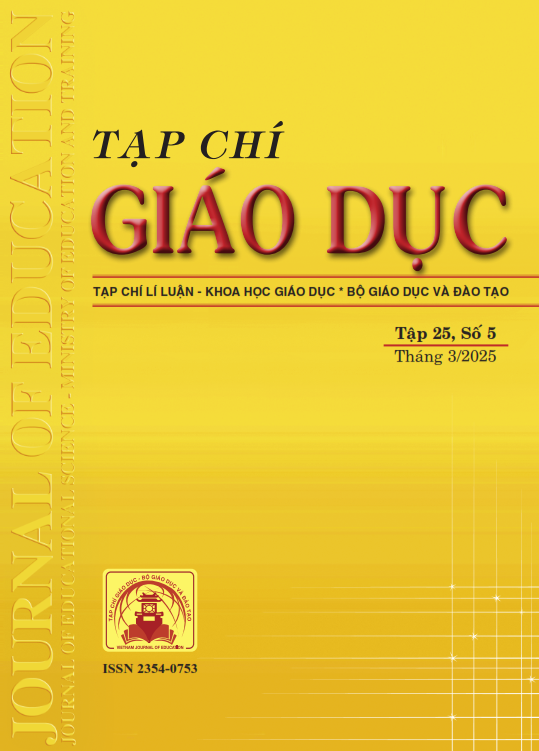Tích hợp bồi dưỡng năng lực số cho học sinh trong dạy học môn Công nghệ ở tiểu học
Tóm tắt
In the current context of digital transformation, digital literacy education for students has gained attention and been implemented around the world and particularly Vietnam. In response to the general development trend of the world, the Ministry of Education and Training has issued a plan to implement digital citizenship skills education according to the 2018 General Education Curriculum at the primary level. Therefore, integrating digital literacy training for primary school students through classroom lessons is crucial to meet the requirements of the current educational innovation. The article presents the concept of digital literacy, the digital literacy framework for primary school students, opportunities to integrate digital literacy training into the Technology subject at primary school, illustrated by a sample integrated lesson on “Using the phone” (Technology 5). It is underlined that integrating digital competency training not only improves students’ skills to solve practical problems but also develops their digital competency through participating in learning activities organized by teachers.
Tài liệu tham khảo
Aesaert, K., Vanderlinde, R., Tondeur, J., & van Braak, J. (2013). The Content of Educational Technology Curricula: A Cross-Curricular State of the Art. Educational Technology Research and Development, 61(1), 131-151.
Bộ GD-ĐT (2018). Chương trình giáo dục phổ thông môn Công nghệ (ban hành kèm theo Thông tư số 32/2018/TT- BGDĐT ngày 26/12/2018). Bộ GD-ĐT (2021). Công văn số 2345/BGDĐT-GDTH ngày 07/6/2021 về việc hướng dẫn xây dựng kế hoạch giáo dục của nhà trường cấp tiểu học.
Bộ GD-ĐT (2024). Tài liệu tập huấn triển khai thí điểm giáo dục kĩ năng công dân số theo Chương trình giáo dục phổ thông 2018 cấp tiểu học.
Đỗ Văn Hùng (chủ biên), Trần Đức Hòa, Nguyễn Thị Kim Dung, Bùi Thanh Thủy, Nguyễn Thị Kim Lân, Đào Minh Quân, Đồng Đức Hùng, Bùi Thị Ánh Tuyết, Bùi Thị Thanh Huyền, Trần Thị Thanh Vân, Trịnh Khánh Vân (2022). Năng lực số 2022: Khung năng lực số dành cho sinh viên. NXB Đại học Quốc gia Hà Nội.
Gómez-Fernández, N., & Mediavilla, M. (2022). Factors influencing teachers’ use of ICT in class: evidence from a multilevel logistic model. Mathematics, 10(5), 799. https://doi.org/10.3390/math10050799
Guitert, M., Romeu, T., & Baztán, P. (2021). The digital competence framework for primary and secondary schools in Europe. European Journal of Education, 56(1), 133-149. https://doi.org/10.1111/ejed.12430
Lê Anh Vinh, Bùi Diệu Quỳnh, Đỗ Đức Lân, Đào Thái Lai, Tạ Ngọc Trí (2021). Xây dựng khung năng lực số cho học sinh phổ thông Việt Nam. Tạp chí Khoa học Giáo dục Việt Nam, số đặc biệt tháng 01, 1-8.
Lê Huy Hoàng (tổng chủ biên), Đặng Văn Nghĩa (chủ biên), Dương Dáng Thiên Hương, Nguyễn Bích Thảo, Vũ Thị Ngọc Thúy, Nguyễn Thanh Trịnh (2023). Công nghệ 5. NXB Giáo dục Việt Nam.
Suwarto, D. H., Setiawan, B., & Machmiyah, S. (2022). Developing digital literacy practices in Yogyakarta elementary schools. Electronic Journal of E-Learning, 20(2), 101-111.
UNESCO (2018). A global framework of reference on digital literacy. UNESCO Institute for Statistics.
Urbancikova, N., Manakova, N., & Ganna, B. (2017). Socio-economic and regional factors of digital literacy related to prosperity. Quality Innovation Prosperity, 21(2), 124-141. https://doi.org/10.12776/QIP.V21I2.942
Tải xuống
Đã Xuất bản
Cách trích dẫn
Số
Chuyên mục
Giấy phép

Tác phẩm này được cấp phép theo Ghi nhận tác giả của Creative Commons Giấy phép quốc tế 4.0 .












